Search results
Projects
Alone Together
Understanding the experiences of older people from culturally and linguistic diverse community backgrounds during COVID-19
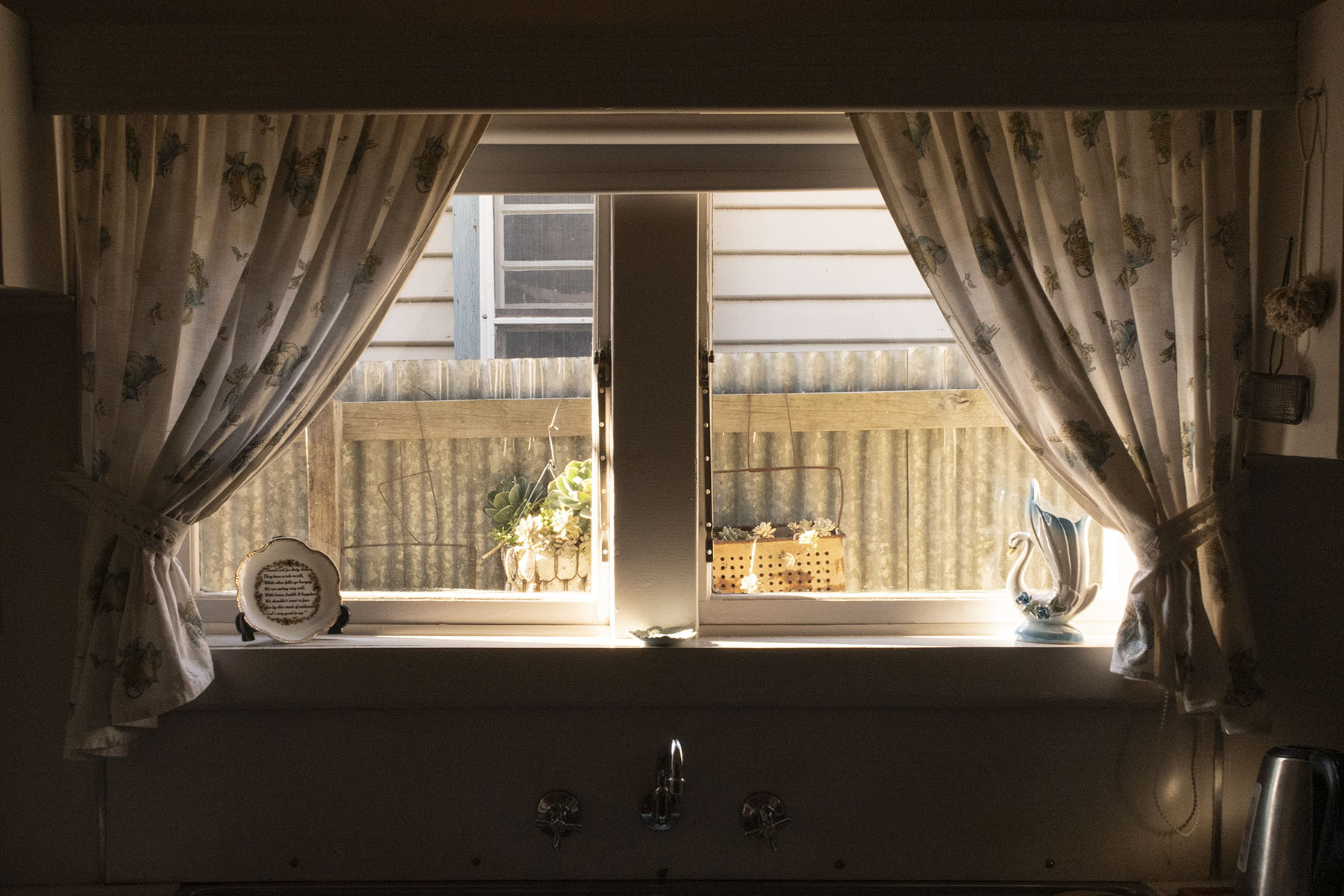
The COVID-19 pandemic has impacted everybody, but we know that its impact has been worse for older people who live independently. We also know that if you come from other countries or if English is your second language your social networks can sometimes be further away and physical distancing and lockdowns can make you feel isolated.
As part of the Alone Together project we are inviting older people from culturally and linguistic diverse communities to talk with one of our research team. We would like to know how COVID-19 has impacted your everyday life; how you are coping with these changes; and what type of services have been useful.
These conversations will help us to understand how to provide better support to older people from these communities in the future.
Research team: Dr Ruth De Souza (RMIT University); Distinguished Professor Larissa Hjorth (RMIT University); Ms Maria Dimopoulos (Special Adviser, Multicultural Communities, Department of Justice & Community Safety); Associate Professor Bianca Brijnath (NARI); Ms Deidre Ellem (Australian Digital Health Agency (ADHA) Consumer –Collaborative Pairs Program); Dr Barbara Barbosa Neves (Monash University); Ms Kate Renzenbrink (Bendigo Health and Clinical Reference Lead for the Australian Digital Health Agency (ADHA) and Collaborative Pairs Program; Dr Jenny Waycott (University of Melbourne); Dr Juan Sanin (RMIT University).
If you would like to get involved with this project, fill out the form below or reach out to project leaders via the contact info provided alongside each bio.
People
Ruth De Souza
VC Research Fellow
School: School of Art
Dr Ruth De Souza (FACN) is a Vice-Chancellor’s Fellow at RMIT, based in the School of Art and DCP Research Platform. She is a nurse, academic and a community-engaged researcher in gender, race, health and digital technologies. Ruth’s Fellowship will engage health professionals in finding new ways to understand, co-design and implement sustainable cultural safety initiatives in a range of health contexts in response to health inequities.
Prior to moving to Australia in 2013, Ruth worked at AUT University where she taught in the School of Nursing, led the Bachelor of Health Promotion, and was a Senior Research Fellow at the Centre for Asian and Migrant Health Research. Since her arrival in Australia, Ruth has undertaken a wide range of roles, including leading an undergraduate nursing program at Monash University’s Berwick campus; spearheading a unique community-engaged joint research appointment with North Richmond Community Health exploring how wearables and other digital technologies are perceived by people from culturally and linguistically different backgrounds and co-ordinating an interdisciplinary Data Systems and Society Research Network across the University of Melbourne. Ruth has also investigated the applicability of cultural safety in Australia, working closely with The Congress of Aboriginal and Torres Strait Islander Nurses and Midwives (CATSINaM), presenting at their National Professional Development Conferences and delivering training on cultural safety. She has also undertaken a two-year cultural safety project with cohealth (a not-for-profit community health organisation) and Our Watch who work for the primary prevention of violence against women and their children.
Games of Being Mobile
First National Survey of Mobile Games in Australia

This project contextualised mobile games as part of broader practices of play, both in the home and extending out into neighbourhoods, urban public spaces and online networks. The Games of Being Mobile project followed nearly sixty households over three years (2013– 2016) in five of Australia’s capital cities: Melbourne, Perth, Adelaide, Sydney and Brisbane. It is the first national survey of mobile games.
The project identified the diverse agencies of mobile media users and players, and the multiple modalities of play. As we face a challenging future, it is our hope that the power of mobile games and playful practices can fuel innovative forms of care, mindful engagement and ethical sociality.
View the report here.
If you would like to get involved with this project, fill out the form below or reach out to project leaders via the contact info provided alongside each bio.
People
Larissa Hjorth
Distinguished Professor and Director, Design and Creative Practice
School: Enabling Capability Platforms
Larissa Hjorth is a digital ethnographer, artist, Distinguished Professor and director of the Design & Creative Practice ECP platform at RMIT University. With Professor Heather Horst, she co-founded the Digital Ethnography Research Centre (DERC). Previously, Hjorth was Deputy Dean, Research & Innovation, in the School of Media & Communication (2013−2016). Hjorth served on the inaugural Australian Research Council (ARC) Engagement & Impact Pilot study assessment panel for humanities and creative practice.
Hjorth studies the socio-cultural dimensions of mobile media and play practices in the Asia-Pacific region with an emphasis on interdisciplinary, collaborative and cross-cultural approaches. She has published a dozen co-authored books, edited over a dozen Handbooks/Companions and has over 40 journal articles.
More recently, Hjorth’s work has become concerned with how we can bring creative, social and design solutions to the growing ageing populations and, in turn, how we might consider scenarios of what it means to die well. She is also studying how our “more-than-human” companions can teach us about new media in everyday life. Hjorth’s last book, Haunting Hands (Oxford Uni Press) looked at how mobile media is being deployed in situations of grief and trauma, her previous book explored how art practice can teach us new acumen into the climate change debate.
Hjorth’s books include Haunting Hands (with Cumiskey 2017), Screen Ecologies (with Pink, Sharp & Williams 2016), Digital Ethnography (Pink et al. 2016) Mobile Media in the Asia-Pacific (2009), Games & Gaming (2010), Online@AsiaPacific (with Arnold 2013), Understanding Social Media (with Hinton 2013), and Gaming in Locative, Social and Mobile Media (with Richardson 2014).
Hugh Davies
Postdoctoral Research Fellow
School: Games
Hugh Davies is an artist, curator and researcher of games and play. His practice explores histories of media devices and cultures of games in the Asia Pacific Region. Awarded a PhD in Art, Design and Architecture from Monash University in 2014, Hugh’s studies in game cultures have been supported with fellowships from Tokyo Art and Space, M+ Museum of Visual Culture and the Hong Kong Design Trust. Hugh is currently a postdoctoral research fellow at RMIT in Melbourne, Australia.
Ingrid Richardson
Professor
School: Media and Communication
Professor Ingrid Richardson has been teaching, supervising and researching in the fields of digital media, mobile media and games for over twenty years. She has a broad interest in the human-technology relation and has published widely on the phenomenology of games and mobile media, digital ethnography and innovative research methods, the relation between technology use and wellbeing, and the cultural effects of urban screens, wearable technologies, virtual and augmented reality, remix culture and web-based content creation and distribution. Ingrid has led or co-led 14 funded research projects, the most recent being an ARC DP [Games of Being Mobile] with Larissa Hjorth. She is contributing co-editor of Studying Mobile Media (Routledge, 2011) and co-author of Gaming in Social, Locative and Mobile Media (Palgrave, 2014), Ambient Play (MIT, 2020), Understanding Games and Game Cultures (Sage, 2020), Exploring Minecraft: Ethnographies of Play and Creativity (Palgrave, forthcoming), and Mobile Media and the Urban Night (Palgrave, forthcoming). Ingrid brings ten years’ experience in university-level HDR management and during this time has actively championed and supported creative methods and practice-led postgraduate research. Over the past five years she has also developed a passion for teaching critical web literacy skills to undergraduate students across all disciplines.
VVet-n-VVild-VVIFI
Holistic Computing Aesthetics Network

VVet-n-VVild-VVIFI aesthetic Research and Development (AR&D) exploring the creative dimensions of internet infrastructure through which artists, technologists and theorists collaborate to address issues of alternative energy, radio transmission, and the future of Wi-Fi technology, as microcontrollers that can be suitably-powered for off-the-grid operation.
VVet-n-VVild-VVIFI explores the innovative capacities and critical implications of computational technology specifically through experiential prototyping and dialogue AR&D to propose alternative net-affinities and rewrite alternatives to avoid any contributing to roadkill of the ‘internet superhighway’. Working towards exhibition series of advanced prototypes for alt-infrastructure networks in 2021 and beyond/VVet-n-VVild-VVIFI is an exemplar of how wireless technology impacts upon traditional exhibition-based practice, radically intervening into public space through the aesthetic application of networking infrastructure in diverse social settings — intimate dens of subnode Intranets, peer to peer networking, autonomous internet beacons that decentre the passage of information and art in diverse social settings, off-grid solar/wind powered.
Find out more about VVet-n-VVild-VVIFI here.
If you would like to get involved with this project, fill out the form below or reach out to project leaders via the contact info provided alongside each bio.
People
Smartphone use during a crisis
Finding and managing information, emotions and networks in times of crisis
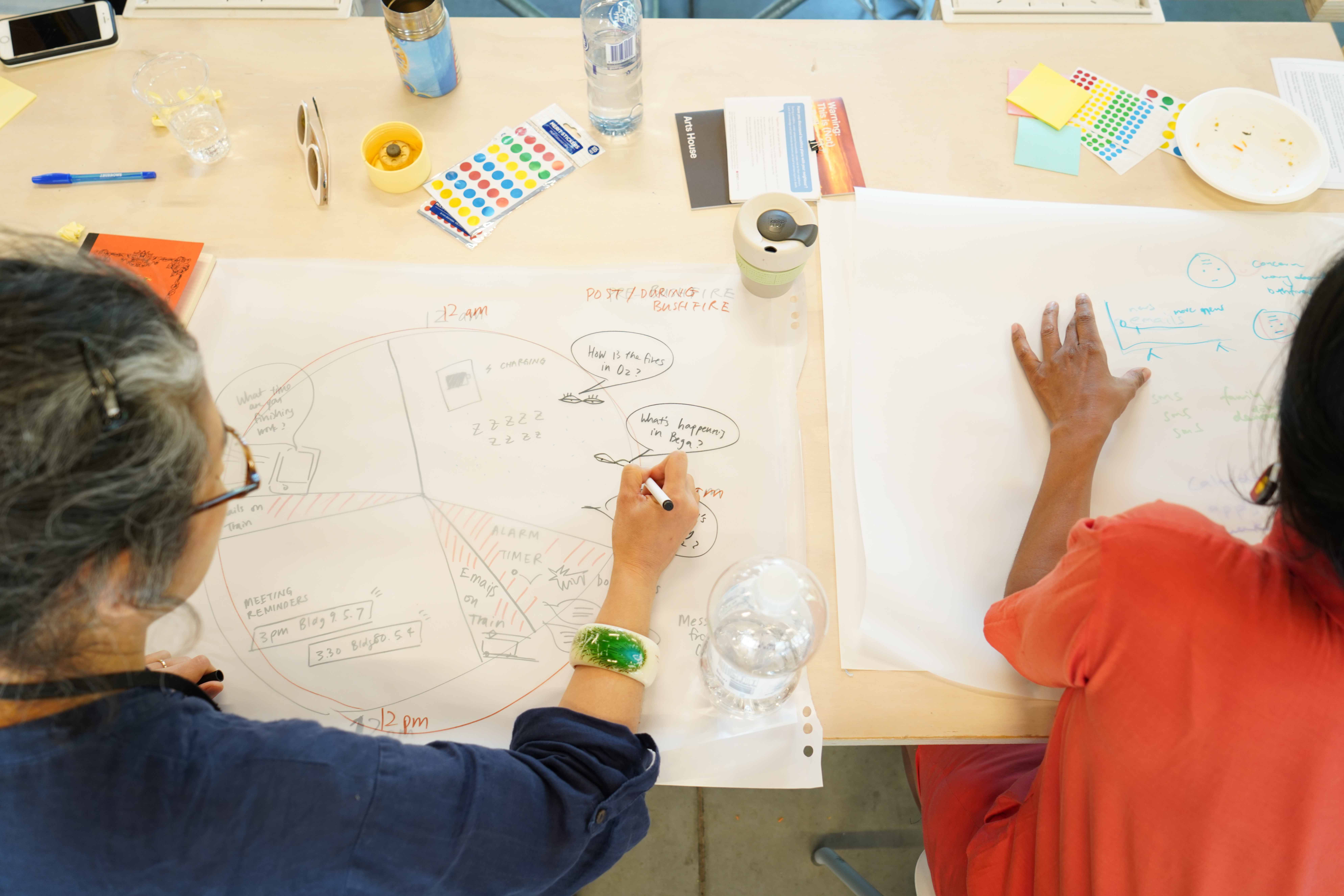
These workshops explored how, as smartphone users, participants were using mobile and non-mobile media to find and manage
information, emotions and networks during the 2019 – 2020 Australian summer bushfire crisis.
Using 3 creative codesign methods, we mapped the key themes, common feelings and practices that emerged during the group discussions. The exercises, and subsequent mapping, generated discussions about key practices and perceptions of how individuals and their communities care during times of crisis. The following preliminary findings emerged:
- Tactics of care
- Care-at-a-distance
- Care literacies
- Direct and indirect affective witnessing
Read the Workshop Summary Report to find out more.
If you would like to get involved with this project, fill out the form below or reach out to project leaders via the contact info provided alongside each bio.
People
Yoko Akama
Associate Professor, Communication Design Cluster
School: Communication Design
+61 3 9925 2805
RMIT staff profile
yoko.akama@rmit.edu.au
Yoko Akama is a design researcher at RMIT University, Australia. She co-leads the Design and Social Innovation in Asia-Pacific network and Design+Ethnography+Futures research program at RMIT.
Her Japanese heritage has embedded a Zen-informed relational practice to carve a ‘tao’ (path) in design and has published extensively on this topic. This practice is shaped by working with regional communities in Australia in strengthening their resilience for disaster preparedness, and with Indigenous Nations enact their sovereignty and self-determination. She is an Adjunct Fellow of a ecosystem innovation studio, Re:public Japan, and Visiting Fellow at the Centre of Excellence in Media Practice, Bournemouth University. She serves on several editorial boards of international journals, and conference review committees. She is a recipient of several major research grants in Australia and the UK and winner of the prestigious Good Design Australia Awards in 2014.
Caitlin McGrane
School: Media and Communication
Caitlin McGrane is a feminist researcher and activist. Her doctoral research investigates how women’s feelings about their smartphone uses and practices can help challenge normative and misogynistic notions of women’s communications. She leads Gender Equity Victoria’s (GEN VIC) ‘Enhancing Online Safety for Women’ project advocating for better support and conditions for women working in media. In 2018 – 2019 she worked with GEN VIC to design a toolkit and a series of videos encouraging prosocial bystander actions on social media. She has worked on projects with the Victorian Trades Hall Council Women’s Team building an online resource to supplement their Gender-Based Violence in the Workplace training package. Her previous research has explored how witnessing anti-feminist harassment can negatively affect individuals’ willingness to publicly identify as feminist and participate in online spaces.
Larissa Hjorth
Distinguished Professor and Director, Design and Creative Practice
School: Enabling Capability Platforms
Larissa Hjorth is a digital ethnographer, artist, Distinguished Professor and director of the Design & Creative Practice ECP platform at RMIT University. With Professor Heather Horst, she co-founded the Digital Ethnography Research Centre (DERC). Previously, Hjorth was Deputy Dean, Research & Innovation, in the School of Media & Communication (2013−2016). Hjorth served on the inaugural Australian Research Council (ARC) Engagement & Impact Pilot study assessment panel for humanities and creative practice.
Hjorth studies the socio-cultural dimensions of mobile media and play practices in the Asia-Pacific region with an emphasis on interdisciplinary, collaborative and cross-cultural approaches. She has published a dozen co-authored books, edited over a dozen Handbooks/Companions and has over 40 journal articles.
More recently, Hjorth’s work has become concerned with how we can bring creative, social and design solutions to the growing ageing populations and, in turn, how we might consider scenarios of what it means to die well. She is also studying how our “more-than-human” companions can teach us about new media in everyday life. Hjorth’s last book, Haunting Hands (Oxford Uni Press) looked at how mobile media is being deployed in situations of grief and trauma, her previous book explored how art practice can teach us new acumen into the climate change debate.
Hjorth’s books include Haunting Hands (with Cumiskey 2017), Screen Ecologies (with Pink, Sharp & Williams 2016), Digital Ethnography (Pink et al. 2016) Mobile Media in the Asia-Pacific (2009), Games & Gaming (2010), Online@AsiaPacific (with Arnold 2013), Understanding Social Media (with Hinton 2013), and Gaming in Locative, Social and Mobile Media (with Richardson 2014).
Writers Immersion and Cultural Exchange
Changing the stories we tell and listen to
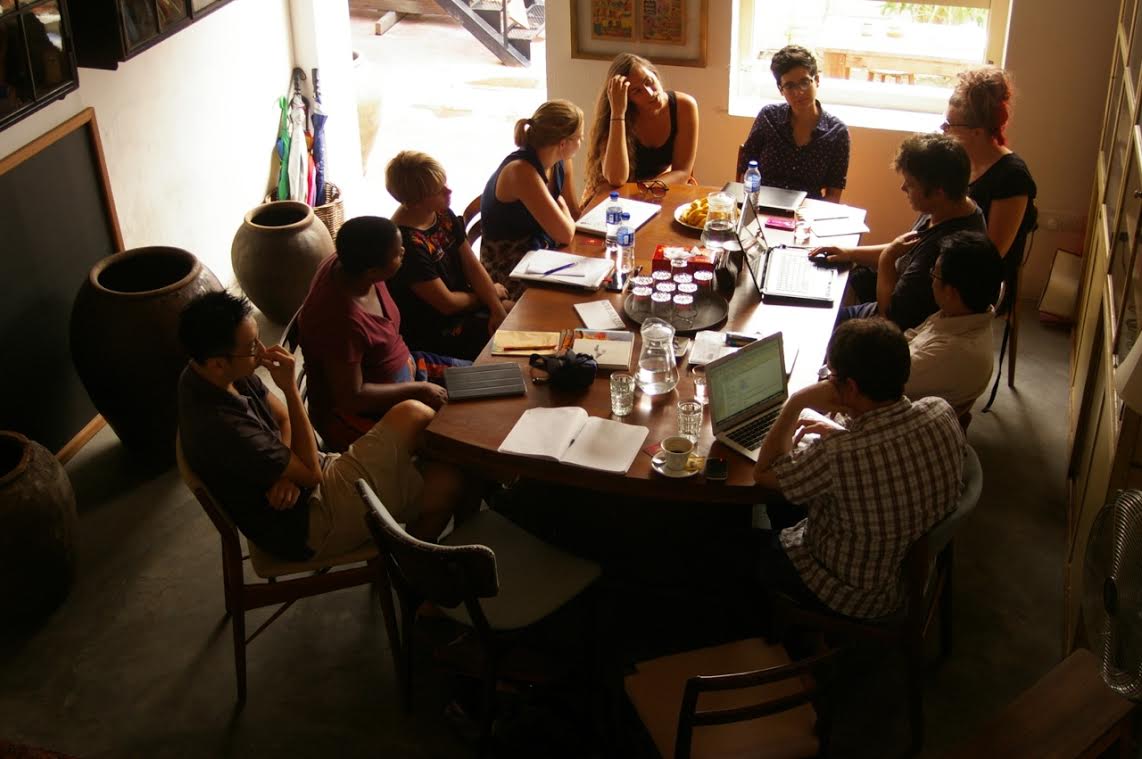
Perspectives shift and networks expand when writers step out of their comfort zone and into unfamiliar cultural spaces where they can connect and share ideas with other writers. Writers Immersion and Cultural Exchange (WrICE) program contributes to an Asia-Pacific community of writers in a collaborative way, influencing broader societal perspectives and changing the stories we tell and listen to. It provides a framework for intercultural and intergenerational dialogue — the exchange and furthering of knowledge, creativity, skills and cultural perspectives.
Visit the WrICE website.
If you would like to get involved with this project, fill out the form below or reach out to project leaders via the contact info provided alongside each bio.
People
Francesca Rendle-Short
Associate Professor and Associate Dean, Writing and Publishing
School: Media and Communication
+61 3 9925 9052
Personal website
francesca.rendle-short@rmit.edu.au
Francesca Rendle-Short is Associate Dean Writing and Publishing in the School of Media and Communication at RMIT University in Melbourne, Australia. She is co-founder of the non/fictionLab research group and co-director of WrICE (Writers Immersion and Cultural Exchange). She has a Doctor of Creative Arts from the University of Wollongong, was a recipient of an International Nonfiction Writers Fellowship to the University of Iowa, and was showcased in the Outstanding Field at Victoria College of the Arts, University of Melbourne.
Francesca Rendle-Short is an award winning novelist, memoirist and essayist. Her books include Bite Your Tongue, Imago, and The Near and The Far; also the forthcoming 100 Love Letters, and No Notes (This is writing). Her artwork is in the collection of the State Library of Queensland.
David Carlin
Professor of Creative Writing, Co-Director of the non/fictionLab, Co-Director WrICE
School: Media and Communication
9225 3934
Personal website
david.carlin@rmit.edu.au
David Carlin is a writer, creative artist and scholar. His books include The Abyssinian Contortionist, Our Father Who Wasn’t There, and (forthcoming) The After-Normal for Rose Metal Press, and 100 Atmospheres: Studies in Scale and Wonder for Open Humanities Press. David’s essays, plays, radio features, exhibitions, documentary and short films have won awards and featured at numerous international festivals. He co-edited a cross-cultural anthology of Asian and Australian writers, The Near and the Far (with Francesca Rendle-Short, Scribe 2016) and Performing Digital (Routledge, 2015), about the Circus Oz Living Archive project he led. Co-President of the NonfictioNOW Conference, the world’s leading conference in literary nonfiction, David is a Professor at RMIT University, Australia, where he co-directs WrICE and non/fictionLab.
News and updates
No results
People
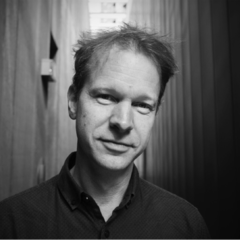
Dr Darrin Verhagen is a senior lecturer in Media and Communication, and runs the Audiokinetic Experiments [AkE] Lab.
Verhagen teaches into the Sound Design specialisation in the Digital Media Program. His work in the AkE Lab uses sound, motion simulators, 4D cinema seating, light and VR to create and audit works that explore the relationship between hearing, vision, movement and vibration. With a background as a soundtrack composer and sound designer for theatre, dance, film and installation, his research interests interrogate the psychophysiology of aesthetic experience, and explore practical applications of such knowledge beyond art.
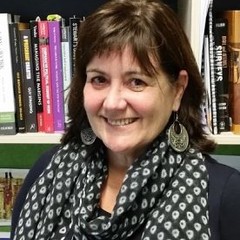
Dr Fiona Macdonald is a Vice-Chancellor’s Senior Research Fellow in the School of Management. Fiona’s research focuses on three interconnected themes: the changing nature of work and employment relationships; regulating for decent work and gender equality; and the political economy of work. The empirical focus of Fiona’s current research on the social care workforce also brings in her long-standing interest in social policy and welfare systems.
In 2016 Fiona was awarded an Australian Research Council Discovery Early Career Researcher Award to examine the workforce challenges of Australia’s new National Disability Insurance Scheme (NDIS). Her research has strong policy relevance and she works closely with industry as well as with national and international networks of employment and care scholars. In 2017 she received the RMIT Vice-Chancellor’s Award for Research impact – Early Career Researcher. Fiona is a member of the Editorial Advisory Board of the recently established International Journal of Care and Caring.

Dr Jaz Hee-jeong Choi is a Vice-Chancellor’s Senior Research Fellow at the Digital Ethnography Research Centre at RMIT. Previously, she was a Founding Member and the Director of the QUT Urban Informatics Research Lab, a transdisciplinary research group exploring and designing at the intersection of people, places, and technologies. She also founded the SIGCHI FoodCHI Network.
She is an advocate for transdisciplinary research, carefully balancing creativity and criticality. Her approach to urban sustainability recognises ‘play’ as the core of transformative interactions in cities as complex techno-social networks. She builds on this to explore how various forms of digital and playful experiences are designed and evolve in different cultural contexts. Her current research explores designing with and for care for liveable and equitable urban futures across three inter-related domains: wellbeing and ageing; impactful research methods, and; co-creative urban transformation.
She has collaborated with leading international researchers, published in books and journals across various disciplines, and given invited talks at major international conferences including the inaugural Global Social Economy Forum in 2013 and the opening keynote at the 2010 UNESCO Creative Cities Conference.
